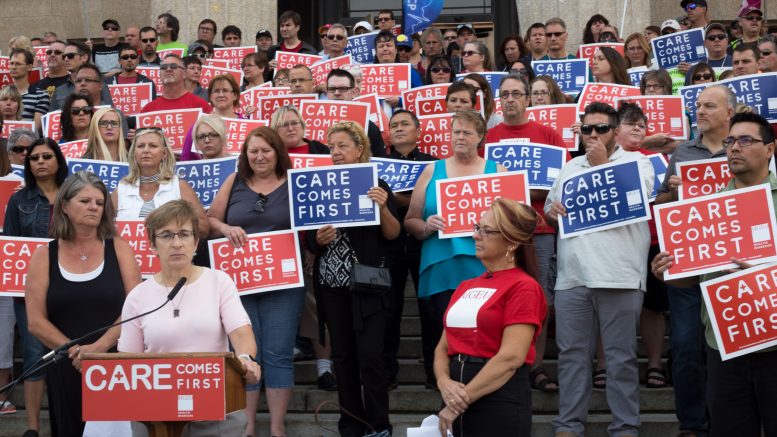Hundreds rallied outside the Manitoba Legislative Building on Sept. 13 to protest ongoing cuts to healthcare.
The rally was organized by the Manitoba Government and General Employees’ Union (MGEU), which represents 40,000 provincial workers from different fields, including the civil service, crown corporations, universities and colleges, and healthcare facilities. MGEU is the largest union in the province.
The rally was attended by healthcare workers, concerned Manitobans, and representatives of other unions, including the Canadian Union of Public Employees (CUPE), University of Manitoba Faculty Association (UMFA), and the Manitoba Nursing Union (MNU).
“We have had enough of our provincial government cutting healthcare services,” said Michelle Gawronsky, president of MGEU. “We are here, asking our government to do the right thing: ‘stop the cuts,’ because care comes first.”
“A year-and-a-half ago, this premier and the health minister promised us that they would protect and invest in public services, and protect those that provide them,” she continued. “But what we’re seeing today is much different.”
Gawronsky spoke of the changes to the healthcare system that have already been implemented, such as the loss of healthcare jobs across the city, QuickCare Clinic and emergency room closures, and said “we’re starting to see that rural Manitoba is next.”
“This is not what Manitobans voted for and it’s certainly no way to run our healthcare system,” she said to a riled-up crowd.
“This is not protecting health services that our children and our grandchildren need, or rely on. This message, ‘stop the cuts,’ [is] being sent today – and we will continue until it stops.”
Among the speakers at the rally were Elizabeth Ballermann, secretary-treasurer of the National Union of Public and General Employees and Terry Rear, MGEU’s component director of healthcare support services.
MNU president Sandi Mowat said she is concerned about the impact of these healthcare cuts on Manitobans.
“Really, it is, I believe, all about money, saving money,” she said, “And nowhere has any of this reorganization been proven to show us it’s going to improve patient care.”
Mowat noted that while nurses try to provide patient care to the best of their ability, they are being “stretched thin” by the ongoing cuts to the provincial healthcare system, which “are impeding their ability to do good work.”

President of Manitoba Nursing Union, Sandi Mowat.
“I think the people don’t realize that there’s long-term effects of all these things, as well,” she said. “And I hope the public understands that this is not good for healthcare and that they will continue to speak up.”
Mowat spoke to the potential impact that these cuts will have on nursing students, explaining that there is a definite concern about employment and nursing placements.
The Manitoban reached out to the University of Manitoba Nursing Students’ Association for comment, but it is not taking a public position on the cuts.
Healthcare cuts: a quick overview
The provincial government has ordered the Winnipeg Regional Health Authority (WRHA) to cut spending by $83 million for the 2017/18 fiscal year. The WRHA currently receives $2.3 billion annually to deliver healthcare.
The province’s total healthcare budget for the 2017/18 fiscal year is approximately $6.7 billion.
Changes to Manitoba’s healthcare system will have a host of impacts, many of which will have long-term effects.
It was announced in April that three of Winnipeg’s six emergency rooms will be closing.
The Victoria General Hospital and Seven Oaks General Hospital ERs will be shut down and be converted to 24/7 urgent care centres. The ER at Concordia Hospital will be closed entirely. The Victoria Hospital’s emergency department will be closed by October, while those at Seven Oaks and Concordia will close sometime in 2018.
Manitoba’s only 24/7 urgent care centre at present, located at Misericordia Health Centre, will be closed and converted to a community intravenous therapy clinic by October of this year.
Four out of Winnipeg’s five QuickCare clinics will be closed, and the services they provide will be relocated to other facilities that provide primary care by January 2018. Staff and resources will be moved to existing ACCESS centres. Simultaneously, working hours at ACCESS centres will be extended.

The rally was attended by healthcare workers, concerned Manitobans, and representatives of other unions.
These changes will also directly impact services for women. The Mature Women’s Centre will shut down in October, and its services will be redirected to Victoria General Hospital.
The province will also privatize adult physiotherapy and occupation therapy by transferring provision of those services from hospitals to private practitioners, forcing Manitobans to pay out of pocket for outpatient physiotherapy and occupational physiotherapy.
Changes will also be made to rural healthcare: the province will close 18 low-volume emergency medical services (EMS) stations, and will eliminate the Medical Student/Resident Financial Assistance Program – a $4.2 million program that offered incentives to medical students to set up practice in rural Manitoba communities.
Premier Brian Pallister announced last Wednesday that the provincial government is considering introducing health premiums – a form of tax that residents would pay based on income.



